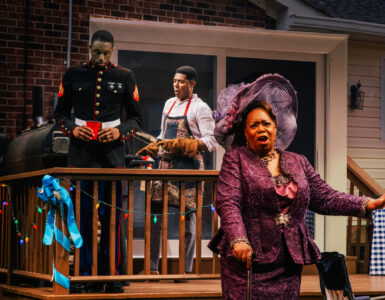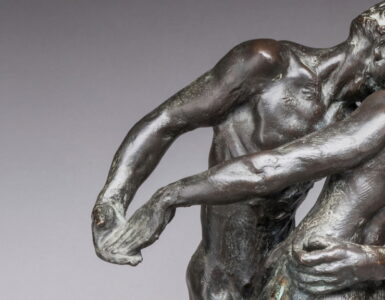A Portrait of Beauty in Flux.
Several weeks ago a colleague of mine, film critic Amy Nicholson, wrote an article in the LA Weekly about the importance of distinguishing between worthwhile women’s films and lesser ones like Luc Besson’s Lucy, which scored superficial points when it put a woman front and center in the narrative but betrayed feminist goals by relegating that character to a soulless automaton. Nicholson’s basic point is that we should think hard before we pay money to support films like Lucy, and I agree. The problem is how very hard it is to find alternatives.
So I’m happy to report that May In the Summer – the latest film by writer/director/lead performer Cherien Dabis – is exactly the kind of women’s film that we need more of: one that explores the inner life of a strong beautiful professional woman, the relationship she has with her mother and sisters, and the struggle she undergoes as she plots her future.
When we meet May (Dabis), a writer whose first book about Arabic proverbs has been an enormous success, she is traveling to Jordan, to her mother’s home to prepare for her wedding to a professor of Islamic studies, Zaid, a Muslim man who, like herself, lives and works in New York. The reunion between mother and daughter is strained; Nadine (Hiam Abbass), May’s mom, is a devout Christian who disapproves of May’s interfaith marriage and has declared she will not to attend the ceremony. A troubled person, Nadine remains bitter over her divorce, some eight years past, from her American-born husband Edward (Bill Pullman). The narcissistic Edward has since married a much younger woman, Anu (Ritu Singh Pande) – only a couple of years older than May herself.
As is often the case with divorce, Edward’s betrayal has wounded not only his first wife but his daughters. Besides May, there is Dalia (Alia Shawkatt), up front about wanting nothing to do with her father and the youngest, Yasmine (Nadine Malouf), a sweet flirty gal who likes men and partying. Like May, they are Westernized women, who live in the States but have returned to Amman for the wedding. When Edward insists that the three siblings visit him and Anu in their large luxurious home (a sharp contrast to Nadine’s cramped rundown apartment), they go reluctantly. The atmosphere is strained and grows even more so when Anu takes May aside and asks for her help with her marriage – evidently not the idyll she would have people believe.
Edward also approaches May for help in making amends, even as May struggles with growing doubts about whether marriage really is for her. A meeting with her future in-laws is cordial, but the extravagance of the wedding plans engineered by Zaid’s mother makes May uncomfortable. Meanwhile, she forms a friendship with a local man who drives her home one night when she’s too drunk to drive. Though their relationship remains platonic, there’s an easiness to their conversation, a compatibility that hints at possibilities were she not spoken for. As she struggles with her parents, separately and together, all the while acting as wise companion for her sisters, and in the meantime concealing from everyone her struggles to write, the reality of Zaid and marriage seem less and less tangible.
Of course all these plot elements would fit just as readily into a messy melodrama or soap, or a dichotomous message vehicle about culture clash and so on. In fact, some of the earliest scenes, especially May’s arrival at her mother’s house, telegraph the pivotal conflict in such an obvious and unsubtle way that I was prepared to be disappointed. But once the polarity between mother and daughter has been established and the characters and their emotional entanglements emerge in all their complexity – the delicate interplay among the sisters, for example – the awkwardness of the initial set-up fades away.
A lot of that success has to do with the performances. Not only that of Dabis, whose intelligent beauty permeates the film, but the supporting players, especially Abbass, with her always abundant humanity and unmistakable womanhood (recall her in The Visitor and Lemon Tree) and Pullman, whose portrayal of a weak disingenuous man is as ever pitch perfect.
Layered over what ultimately proves to be a dark and poignant family comedy is the film’s cultural perspective, its insights into a Middle Eastern society in flux and its discerning look into both the differences and similarities between that society and our own.
On the one hand are shots of May as she boldly jogs through the streets of Amman, defying the stares of the neighborhood men. On the other are wild drunken scenes at a disco that could just as well be New York or London. One especially telling moment comes when May and her sisters decide to spend a couple of days at a vacation resort off the Dead Sea. May and Dalia are talking while others are enjoying the beach when there’s the sound of aircraft overhead and all heads turn skyward. And in that one fleeting apprehensive moment you have the fragility, and relative meaninglessness, of all that’s gone before.
May In The Summer opens at select theaters August 29.
Review by Deborah Klugman.








Very quickly this web site will be famous among all blog users, due to it’s good content